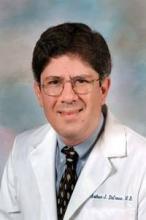The American Medical Association’s updated policy on maintenance of certification is generating discussion, particularly as it relates to MOC’s role in licensure and credentialing.
According to the new policy, recently approved by delegates during the 2014 AMA Interim Meeting in Dallas, “the MOC program should not be a mandated requirement for licensure, credentialing, payment, network participation, or employment.” The American Gastroenterological Association agrees with AMA’s position.
Dr. Arthur J. DeCross, AGAF, chair of the AGA Institute’s MOC Subcommittee and associate professor of medicine at the University of Rochester (N.Y.) Medical Center, said in an interview. “Maintenance of certification is really about life-long continuing medical education. It is really a way of saying it is not enough to pass a test, a board exam, when you graduate medical training and be grandfathered into several decades of clinical practice without ever having your certification updated or without demonstrating ... that you are current and competent in medical practice.”
AMA said in a statement to this news organization that the recent change in policy was “introduced in relation to an increase in the frequency of requirements for one or more [American Board of Medical Specialties member boards’] programs and concerns about the relevance of selected MOC activities to physician clinical practice.”
The AGA will continue to work productively with the American Board of Internal Medicine to ensure that the process is relevant to the needs of our members and is not unduly burdensome or costly. The AGA governing board is convening a task force to study these issues and identify the ideal pathway to recertification and assessment of physician competency.
Other MOC policy updates call for a process based on evidence and designed to identify performance gaps and unmet needs, providing direction and guidance for improvement in physician performance and delivery of care; that is examined periodically to evaluate physician satisfaction, knowledge uptake, and intent to maintain or change practice; and that is a tool for continued improvement.
AMA also is calling for practicing physicians to be well represented on specialty boards developing MOC programs, and those programs should include activities and measurements that are relevant to clinical practice and not be cost prohibitive or present barriers to patient care.
Delegates also voted to encourage specialty boards to investigate alternative approaches to MOC and directed the organization to report annually on the MOC process.
Specialty boards, “should have no financial interest in the [MOC] process,” according to an AMA document on the resolutions from the meeting.



